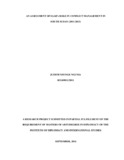| dc.description.abstract | South Sudan is blessed with an abundance of natural resources ranging from fertile land to oil. However, these resources have not been exploited to their full. Of significance here is the oil sector which has been abused by different factions in South Sudan‟s civil war. South Sudanese rebel groups recently claimed control of Upper Nile state. The link between armed groups, ethnic conflict, resources, cattle raiding and political fractionalization has created a complex security situation. In addition, the traditional structures that were important for upholding the society together have disintegrated because of the conflict situation n the country and the new value systems by the western nations. In sum the ability to deal with violence and criminality in South Sudan is low. The South Sudan Armed Forces (SSAF) and the South Sudan Police Service (SSPS) lack the necessary capacity to deal with this and thus provide security in the country. This study sought to assess IGAD‟s role in conflict management in South Sudan. The research deign used in this study was descriptive and explorative research. The research site was in Nairobi and possibly South Sudan. A number of data collections methods were used in this study and this included an open ended questionnaire for the key respondents. For the purpose of this study the target population was 50. It was stratified through the various groups as a target. The data collected was first be coded. After coding there was data entry and analysis whereby the data was analyzed using content analysis. The study concludes that the major factor that has been sustaining the conflict in South Sudan was tribalism/ ethnic intolerance driven by political incitements. The study concludes that the most common other possible solutions to the conflict in South Sudan engaging in home based negotiations like those that took place in Somalia (Fight against Warlords. The study concludes that breakdown of law and order in South Sudan creates security threats to the South Sudanese people and its neighbors. Based on the findings, the study recommends Galtung Johan‟s‟ theory of constructive, concrete and creative approach prognosis in mediating, negotiating and resolution of any conflicts situation. This could be the only situation to peaceful conflict transformation. The international bodies must provide interventions to prevent negative prognoses while the local actors must maintain and be clear to the needs, and rights of the people in bringing satisfaction peaceful culture and structure. | en_US |



